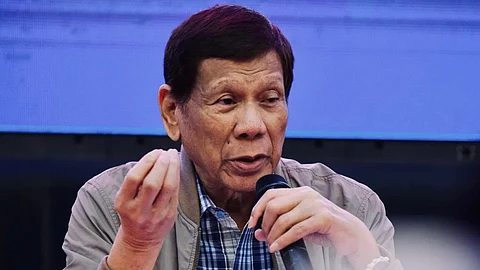
- NEWS
- the EDIT
- COMMENTARY
- BUSINESS
- LIFE
- SHOW
- ACTION
- GLOBAL GOALS
- SNAPS
- DYARYO TIRADA
- MORE

The camp of former President Rodrigo Duterte has renewed its appeal for his temporary release from International Criminal Court (ICC) custody as the pre-trial hearing for his crimes against humanity case draws near.
The filing of the petition came just over a month before Duterte faces the ICC judges anew for the confirmation of charges scheduled for 23 to 26 September.
The erstwhile leader has been detained at Scheveningen Prison in The Hague, Netherlands, since his arrest on 11 March in Manila on an ICC warrant.
His lawyer, Nicholas Kaufman, assured the ICC that they are willing to comply with “any conditions deemed appropriate” by the tribunal should it allow Duterte’s “immediate release” to an unnamed country.
“Mr. Duterte’s presence at confirmation proceedings may be waived but, if necessary, may equally be ensured by way of videoconferencing,” the heavily redacted petition dated 19 August read. “Monitoring conditions of release and contact restrictions may be ensured through [redacted].”
Only two state parties, namely, Argentina and Belgium have signed cooperation agreements on interim release with the ICC.
But the defense told the tribunal that the country willing to host Duterte “has already undertaken to abide by all conditions as would be required by Article 4(2) of the Model Agreement on Interim Release.”
“For the sake of clarity, the defense informs the Pre-Trial Chamber that the [redacted] continues to affirm its willingness to cooperate with the court, to accept Mr. Duterte onto its territory, and to enforce conditions of release,” the filing read.
The prosecution and the lawyers of the drug war victims have strongly opposed the defense’s request, asserting that Duterte would pose a direct and significant threat to the victims.
The prosecution earlier said they would only agree if Duterte were transferred to a country of their choosing — not the defense’s — which has “a history of extensive cooperation with the court.” The two countries, however, were not revealed.
“The defense’s submission that Mr. Duterte would not abscond from [his chosen country] for fear of embarrassing his hosts is highly unpersuasive given Mr. Duterte’s history of making disparaging and insulting remarks about heads of state and world leaders,” read the filing of ICC Deputy Prosecutor Mame Mandiaye Niang dated 24 June.
Negligible, negotiable
But Kaufman countered that the prosecution’s objection is “either negligible or negotiable,” and that their preferred host country has “an extensive history of actively opposing interim release onto its territory.”
At present, there are 125 state parties to the Rome Statute, the ICC’s founding treaty. Nineteen are in the Asia-Pacific, including Japan, Korea, Cambodia and Timor-Leste. African states account for the largest bloc with 33 countries, followed by Latin American and Caribbean states with 28. Western European and other countries comprise 25, while Eastern Europe makes up 20.
The Philippines, under Duterte’s watch, withdrew from the Rome Statute in March 2019 after the ICC launched a preliminary probe into the alleged extrajudicial killings linked to the notorious anti-drugs campaign.
The ICC, however, pushed back and asserted its jurisdiction over the killings committed prior to the country’s withdrawal, emphasizing that the preliminary probe had begun before the departure from the treaty.
To recall, Duterte’s camp has sought his temporary release since 12 June, citing his advanced age, not being a flight risk, and the unlikelihood of committing again the crimes he is accused of. But two days later, Kaufman asked the ICC to defer ruling on their request, which the ICC granted.
The 80-year-old Duterte is facing a single charge of crimes against humanity in connection with his brutal war on drugs, which saw more than 6,000 deaths based on government data, though rights watchdogs estimate the death toll exceeded 30,000.
The figure only accounts for the summary killings during Duterte’s presidency, with ICC records spanning earlier incidents from as early as November 2011 during Duterte’s term as Davao City mayor.
The charges against the former leader, however, could still be expanded to include other offenses such as torture and rape if the prosecution can produce additional evidence to substantiate these during the pre-trial hearing.
